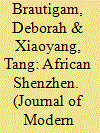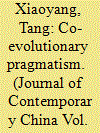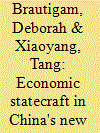|
|
|
Sort Order |
|
|
|
Items / Page
|
|
|
|
|
|
|
| Srl | Item |
| 1 |
ID:
102398


|
|
|
|
|
| Publication |
2011.
|
| Summary/Abstract |
This article examines recent Chinese efforts to construct a series of official economic cooperation zones in Africa. These zones are a central platform in China's announced strategy of engagement in Africa as 'mutual benefit'. We analyse the background, motives and implementation of the zones, and argue that they form a unique, experimental model of development cooperation in Africa: market-based decisions and investment by Chinese companies are combined with support and subsidies from an Asian 'developmental state'. Though this cooperation provides a promising new approach to sustainable industrialisation, we also identify serious political, economic and social challenges. Inadequate local learning and local participation could affect the ability of the zones to catalyse African industrialisation. The synergy between Chinese enterprises, the Chinese government and African governments has been evolving through practice. A case study of Egypt provides insight into this learning process.
|
|
|
|
|
|
|
|
|
|
|
|
|
|
|
|
| 2 |
ID:
095350


|
|
|
|
|
| Publication |
2009.
|
| Summary/Abstract |
Agriculture is a rapidly growing arena for China's economic engagement in Africa. Drawing on new field research in East and West Africa, and in Beijing and Baoding, China, as well as earlier archival research, this article investigates the dimensions of China's agricultural engagement, placing it in historical perspective. It traces the changes and continuities in China's policies in rural Africa since the 1960s, as Chinese policies moved from fraternal socialism to amicable capitalism. Beginning in the 1980s, the emphasis on aid as mutual benefit began to blur the lines between aid, south-south co-operation and investment. Today, Beijing has established at least 14 new agro-technical demonstration stations using an unusual public-private model that policy makers hope will assist sustainability. At the same time, a stirring of interest among land-scarce Chinese farmers and investors in developing farms in sub-Saharan Africa evokes a mix of anticipation and unease.
|
|
|
|
|
|
|
|
|
|
|
|
|
|
|
|
| 3 |
ID:
174780


|
|
|
|
|
| Summary/Abstract |
There is a gap between the elusive concept of Beijing Consensus and China’s effective practices to promote economic growth at home and in other countries. This article aims to expound this phenomenon by examining both the rationale underlying China’s structural transformation and the corresponding practices in development cooperation. Using a case study on the evolution of infrastructure construction within China and abroad, this article argues that China's success has little to do with a new pattern of state capitalism, but rather presents a different manner of understanding and facilitating modernization. Target-oriented non-linear synergism can drive comprehensive transformation more effectively in developing countries than model-oriented linear mechanism. With a consistent goal, the pragmatic thinking enables multiple stakeholders to coevolve in diverse contexts through open attitude.
|
|
|
|
|
|
|
|
|
|
|
|
|
|
|
|
| 4 |
ID:
113287


|
|
|
|
|
| Publication |
2012.
|
| Summary/Abstract |
China's rapidly growing economic engagement with other developing countries has aroused intense debates, but these debates have often generated more heat than light. The Chinese government is clearly pushing its companies to move offshore in greater numbers, and state-owned firms figure prominently in many of the major investments abroad. Yet relatively little research exists on when, how and why the Chinese government intervenes in the overseas economic activities of its firms. China's state-sponsored economic diplomacy in other developing countries could play three major strategic roles: strengthening resource security, enhancing political relationships and soft power, and boosting commercial opportunities for national firms. This article examines China's programme to establish overseas special economic zones as one tool of Beijing's economic statecraft. It traces the process by which they were established and implemented, and investigates the characteristics of the 19 zones initially selected in a competitive tender process. The article concludes that even in countries rich in natural resources, the overseas zones were overwhelmingly positioned as commercial projects. Particularly in the Asian zones, China is following in the footsteps of Japan. The zone programme, and the Chinese foreign investment it hoped to foster, represents a clear case of the international projection of China's developmental state. However, in Africa (but not generally elsewhere) discourse surrounding the zones publicly positions them as a transfer of China's own development success, thus potentially enhancing China's political relationships and soft power on the continent.
|
|
|
|
|
|
|
|
|
|
|
|
|
|
|
|
| 5 |
ID:
166876


|
|
|
|
|
| Summary/Abstract |
As Chinese investors set up business operations in Africa, disagreements between Chinese and Africans regarding work attitudes have emerged. A prevailing view is that cultural differences cause tensions between groups with regards to the meaning of “hard work,” “discipline” and “eating bitterness.” However, we argue that conflicting perceptions of work ethics between Chinese and Africans are instead caused by evolving notions of time that accompany a transition from a pre-capitalist manner of production to that of industrial capitalism. First, we refute the assumption that culture determines work ethics. Second, we show that when a society industrializes, its notions of work ethics and time perception change; we then show how China's industrialization impacts its approaches to operations in Africa. Third, we use two case studies of Chinese investments in Tanzania and Ethiopia to illustrate how Chinese managers are changing African workers’ attitudes through time discipline. Finally, we discuss the implications of a convergence of work ethics between Chinese and Africans.
|
|
|
|
|
|
|
|
|
|
|
|
|
|
|
|
|
|
|
|
|